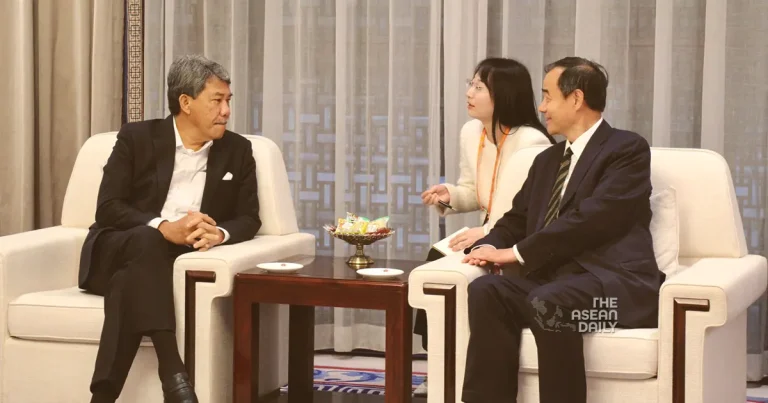24-4-2024 (KUALA LUMPUR) The Malaysian Foreign Minister, Dato’ Seri Utama Haji Mohamad bin Haji Hasan, touched down in Beijing on Tuesday for a three-day visit, marking his inaugural trip to China since assuming his post in December 2023. According to Chinese experts, this visit could pave the way for future high-level exchanges between the two nations and aims to implement a series of consensus reached by their respective heads of state in 2023.
Several experts have lauded the relationship between China and Malaysia as exemplary and pragmatic among China’s ties with ASEAN countries. Despite changes in the Malaysian government since 2018, the overarching direction of cooperation between the two nations has remained largely unaffected.
Experts note that Malaysia has adopted a relatively pragmatic and moderate stance on the contentious South China Sea issue, emphasizing dialogue as the primary means of addressing the matter. This approach is seen as a positive signal for the region, especially as the Philippines continues to provoke tensions under the alleged instigation of the United States.
During his visit to Beijing, the Malaysian Foreign Minister is scheduled to hold crucial meetings with Chinese leaders, focusing on strengthening bilateral ties and discussing key regional and international issues. This visit coincides with the celebration of 50 years of diplomatic relations and 11 years since the elevation of ties to a comprehensive strategic partnership between the two countries, as highlighted by the Malaysian Foreign Ministry on the social media platform X.
In Beijing, the senior Malaysian diplomat will engage in talks with his Chinese counterpart, Foreign Minister Wang Yi, to discuss bilateral, regional, and international issues of mutual interest. This will provide an opportunity for both sides to assess the progress of bilateral cooperation and explore new areas for collaboration, according to a statement released by the Malaysian foreign ministry on Tuesday.
Additionally, the Malaysian Foreign Minister is set to meet with Liu Jianchao, the head of the International Department of the Communist Party of China (CPC) Central Committee, and other CPC leaders. He will also engage with the Malaysian diaspora during his visit.
“This visit primarily focuses on implementing the consensus reached between the leaders during [Prime Minister] Anwar Ibrahim’s visit to China last year,” said Ge Hongliang, vice dean of the ASEAN College at Guangxi Minzu University. Ge added that the visit will also concentrate on advancing the high-quality joint construction of the Belt and Road Initiative, which includes the strategic alignment of three major initiatives under Malaysia Madani (a policy framework that focuses on good governance and sustainable development).
As the two countries celebrate the 50th anniversary of diplomatic relations, the visit serves to review past developments and envision the future of China-Malaysia relations.
During a meeting with Chinese President Xi Jinping in Beijing on March 31, 2023, Malaysian Prime Minister Datuk Seri Anwar Ibrahim expressed that China’s proposed Global Security Initiative (GSI), Global Development Initiative (GDI), and Global Civilization Initiative (GCI) resonate with Malaysia Madani. Anwar recognized China’s protection of mosques and respect for religious freedom, stating that Malaysia is willing to deepen dialogue on civilization with China.
In August 2023, Anwar met with Wang Yi in Penang, where the Chinese Foreign Minister stated that the high-quality Belt and Road cooperation has yielded fruitful results, and the construction of the East Coast Rail Link and “Two Countries, Twin Parks” has achieved good economic and social effects, indicating broad prospects for practical cooperation between the two countries.
According to Xu Liping, director of the Center for Southeast Asian Studies at the Chinese Academy of Social Sciences, the primary purpose of the Malaysian Foreign Minister’s visit is to prepare for future high-level exchanges.
In September 2023, local news site The Star reported that Anwar had invited Chinese President Xi and Premier Li Qiang to visit Malaysia in 2024 to commemorate five decades of diplomatic relations between the two countries.
April has witnessed a flurry of high-level visits from other Southeast Asian countries to China, in addition to Malaysia. Chinese Foreign Minister Wang also held talks with Vietnamese Foreign Minister Bui Thanh Son in South China’s Guangxi Zhuang Autonomous Region earlier in April and recently concluded visits to Indonesia and Cambodia.
According to Ge, such frequent interactions between China and ASEAN countries signal a consensus on maintaining regional security, stability, and peace, noting that there is also a hope for certain countries to refrain from provoking tensions over the South China Sea issue.
Xu noted that the recent frequent high-level interactions between China and the ASEAN countries send a signal that attempting to stand against China and amplify differences is not beneficial for these countries. “Only through cooperation with China can real benefits be obtained,” she stated.
Mohammad Faisal Bin Abu Suaib Khan, Executive Secretary of the UMNO Malaysia Election Department, expressed, “It’s not only Malaysia, I think a lot of countries also don’t like conflict, so a lot of countries are going for cooperation, well-being, and we grow together.” He added, “So expectation for me as a Malaysian, we expect what is positive, we share together.”
Regarding the 50th anniversary of diplomatic relations between Malaysia and China, the Malaysian official said, “With China, this 50 years of anniversary between Malaysia and China, we hope it can be the prosperity for all of us.”
Some experts have highlighted Malaysia’s significant role within ASEAN, including its cooperation with China among the ASEAN countries.
On the South China Sea issue, Ge remarked, “Malaysia has consistently maintained a pragmatic and moderate approach,” noting that the Southeast Asian country places greater emphasis on dialogue with China on the matter.




